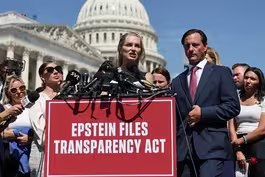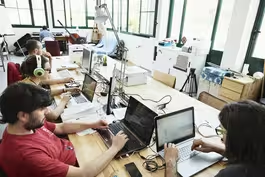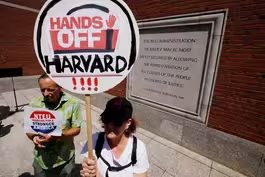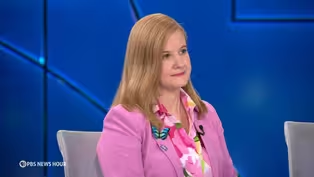
What China's military parade and diplomacy mean for U.S.
Clip: 9/3/2025 | 9m 42sVideo has Closed Captions
What China's display of military might and diplomacy mean for the U.S.
There was an extraordinary display of military might on the streets of Beijing. China's parade was the culmination of several days of high-level diplomacy, without the United States, as China seeks to cement its place as a preeminent global power. Nick Schifrin discussed the gathering of leaders with Kurt Campbell, deputy secretary of state during the Biden Administration.
Problems playing video? | Closed Captioning Feedback
Problems playing video? | Closed Captioning Feedback
Major corporate funding for the PBS News Hour is provided by BDO, BNSF, Consumer Cellular, American Cruise Lines, and Raymond James. Funding for the PBS NewsHour Weekend is provided by...

What China's military parade and diplomacy mean for U.S.
Clip: 9/3/2025 | 9m 42sVideo has Closed Captions
There was an extraordinary display of military might on the streets of Beijing. China's parade was the culmination of several days of high-level diplomacy, without the United States, as China seeks to cement its place as a preeminent global power. Nick Schifrin discussed the gathering of leaders with Kurt Campbell, deputy secretary of state during the Biden Administration.
Problems playing video? | Closed Captioning Feedback
How to Watch PBS News Hour
PBS News Hour is available to stream on pbs.org and the free PBS App, available on iPhone, Apple TV, Android TV, Android smartphones, Amazon Fire TV, Amazon Fire Tablet, Roku, Samsung Smart TV, and Vizio.
Providing Support for PBS.org
Learn Moreabout PBS online sponsorshipGEOFF BENNETT: Welcome to the "News Hour."
An extraordinary display of military might on the streets of Central Beijing today, as China's president, along with the leaders of Russia and North Korea, marked the 80th anniversary of the defeat of Imperial Japan.
AMNA NAWAZ: The military parade was the culmination of several days of high-level diplomacy, but without the United States, as China seeks to cement its place as a preeminent global power.
Nick Schifrin starts our coverage.
NICK SCHIFRIN: In downtown Beijing, a symphony of sycophancy, as Chinese President Xi Jinping encouraged the eager soldiers of the People's Liberation Army, and, to a sea of adorning fans, a manifestation of military might, new hypersonic missiles designed to target American ships, new intercontinental ballistic missiles that can reach American shores, new submarine drones, and massive new unmanned aircraft.
It was a not-so-subtle warning today to China's rivals.
NARRATOR: Eight terrible years of struggle are over at last for China.
NICK SCHIFRIN: Timed to the 80th anniversary of Imperial Japan's surrender to pre-communist China after nearly a decade fighting Chinese troops.
Today, Xi called the past prologue.
XI JINPING, Chinese President (through translator): They fought for the survival of the country.
Today, humanity again faces a choice between peace and war.
The rejuvenation of the Chinese nation is unstoppable.
DONALD TRUMP, President of the United States: They were hoping I was watching, and I was watching.
NICK SCHIFRIN: In Washington, President Trump praised the parade's pomp and Xi Jinping himself, but accused Beijing of ignoring America's role in defeating World War II Japan.
DONALD TRUMP: I don't believe that America -- that the United States was acknowledged for helping China to get to -- to gain its freedom.
NICK SCHIFRIN: But the freedom that Xi envisioned today was from what he calls U.S. hegemony.
And, for that, he brought allies.
This was the first ever in-person meeting of Xi, Russian President Vladimir Putin, and North Korean leader Kim Jong-un.
Today, Xi and Putin, both 72 years old, joked as the cameras rolled that technology could allow them to live to 150 or even -- quote -- "achieve immortality."
Last night online, President Trump wrote that the three leaders were conspiring against the U.S. Today, Putin laughed that off.
VLADIMIR PUTIN, Russian President (through translator): The U.S. president is not without humor.
We all know this well.
Everyone expresses hope that the position of President Trump and the position of Russia and other participants in the negotiations will lead to the end of the armed conflict.
NICK SCHIFRIN: Armed conflict in Ukraine, where the axis of autocracies has been activated, China provides the vast majority of machine parts to run Russia's weapons production.
And North Korea has provided Russia more than 10,000 soldiers to fight Ukraine, as shown recently on North Korean state TV.
Today, Kim told Putin, ask for more, and it is given.
KIM JONG-UN, North Korean Leader (through translator): If there's any way we can assist Russia, we will certainly do it as a fraternal duty.
We will spare no effort in providing help.
NICK SCHIFRIN: And Xi got more help to counter the U.S. earlier this week when he and Putin met Indian Prime Minister Narendra Modi.
For years, across four presidencies, the U.S. has courted Modi as a counter to China.
But, recently, President Trump's relationship with Modi has soured at the same moment that Modi appears open to a closer relationship to Beijing and the Chinese organization that Xi Jinping says can blunt U.S. leadership.
NARENDRA MODI, Indian Prime Minister (through translator): The Shanghai Cooperation Organization can become the guiding light for multilateralism and an inclusive world order.
NICK SCHIFRIN: For a perspective on today's parade in Beijing and the gathering of leaders from Russia, North Korea, Iran, and others over the past few days in China, we turn to Kurt Campbell, the former deputy secretary of state, who was the chief architect of the Biden administration's policy toward Asia.
Kurt Campbell, thanks very much.
Welcome back to the "News Hour."
Let me start with the -- where we ended our story, which was Prime Minister Modi embracing the Shanghai Coordination Organization, really one of the tools that Xi Jinping is using to try and counter us influence around the world.
How much of a challenge is it to the U.S. when leaders from all over the world fly to China and embrace that kind of vision?
KURT CAMPBELL, Former U.S. Deputy Secretary of State: Look, it's a big deal.
It's undeniably a major stroke on the part of the Chinese leadership.
And it's not just that India and a couple of other states are there, but a number of key countries in the Global South, what we would call the swing states of the 21st century, were in attendance as well.
I'm most concerned, though, about India.
I think all of us who've played a role in building this relationship are in shock and concerned by what we have seen in terms of the substantial degradation in relations in just a couple of weeks.
And Modi is sending a very clear message to the United States: I have other options.
NICK SCHIFRIN: But there's a lot of history there.
There's a lot of water under the bridge, of course.
Do you really believe that, as you just suggested, the Trump-Modi relationship has soured just in the last few weeks?
Do you really believe that New Delhi would lean toward Beijing in a strategic way moving forward?
KURT CAMPBELL: I do not.
The Indians will be very wary of a full-in, all-in embrace of China.
They can't go in that direction.
But they will move perceptively towards more economic and commercial engagement.
The strategic distrust is still too great.
NICK SCHIFRIN: There has, of course, been a full embrace between Beijing and Moscow.
When you, when other senior officials in the Biden administration were planning how to respond to Russia's full-scale invasion in Ukraine, there were a lot of questions about how far Beijing would go to support Moscow's effort.
In retrospect, did you guys not see this coming, the extent of strategic partnership between Beijing and Moscow?
KURT CAMPBELL: I think many of us were surprised at the depth of the engagement that China has undertaken with respect to its military and other technological support for Russia in its brutal war with Ukraine.
I think the Trump administration comes to power, Nick, with a view that somehow they're going to be able to split this alliance that has emerged between Beijing and Moscow.
I think that is wrong.
The best approach is to put pressure on China with respect to its energy purchases from Russia, but also gather our partners around us.
And I think the juxtaposition of this remarkable gathering that Xi is putting together in Beijing is the relative disarray of American partners, all of whom are deeply anxious about the trade negotiations they have experienced with Washington over the course of the last couple of months.
NICK SCHIFRIN: Southeast Asian officials describe to me surely as a frustration with the Trump policy when it comes to tariffs, but they see a continuation of regional policy of the alliance structure especially that the first Trump administration started, that you accelerated, and that continues with this Trump administration trying to create more alliances to counter Beijing.
Do you see a continuity when it comes to the military efforts at least in Asia?
KURT CAMPBELL: I don't.
And, in fact, I don't see what you described there, Nick, really very much at all.
I think what I see is high-level diplomacy between the United States and our key partners like South Korea, Japan, Australia and others, most of those discussions are just filled with friction.
And there is no real alignment on joint efforts to work together, beyond just the narrow military realm.
NICK SCHIFRIN: Back to the parade today, Kurt Campbell.
We saw a lot of new military hardware.
We saw new Chinese missiles designed to counter American ships, new ICBMs and of course, a slew of both aerial and undersea drones.
Does that message of deterrence, is that effective?
KURT CAMPBELL: There's nothing really of surprise in terms of what's been rolled out.
However, the determination in which it is basically taken through Tiananmen Square, the language that President Xi used about extinguishing threats to China, the key here is not just to look at this parade.
It is the totality of the events of the last week.
China wants to signal that it is a stabilizing, leading player on the global stage that other countries can count on.
And they're very clearly trying to juxtapose their role with the role that they're describing that the United States as playing, dangerous, provocative, unsettling.
NICK SCHIFRIN: Kurt Campbell, former deputy secretary of state, thank you very much.
KURT CAMPBELL: Thank you.
It's a pleasure.
Climate refugees forced to adapt as rising sea swallows land
Video has Closed Captions
Clip: 9/3/2025 | 8m 36s | As rising sea levels swallow Bangladesh's land, its climate refugees are forced to adapt (8m 36s)
Epstein survivors demand justice as Trump calls case a hoax
Video has Closed Captions
Clip: 9/3/2025 | 3m 1s | Epstein survivors demand justice in Washington as Trump calls case 'a Democrat hoax' (3m 1s)
How future workers will adapt as AI reshapes jobs
Video has Closed Captions
Clip: 9/3/2025 | 6m 57s | How the next wave of workers will adapt as artificial intelligence reshapes jobs (6m 57s)
Museum showcases the pets who have lived in the White House
Video has Closed Captions
Clip: 9/3/2025 | 5m 19s | Museum exhibit showcases the pets who have lived in the White House (5m 19s)
News Wrap: Court says Trump unlawfully blocked Harvard funds
Video has Closed Captions
Clip: 9/3/2025 | 6m 15s | News Wrap: Judge rules White House unlawfully blocked Harvard's research grants (6m 15s)
Rulings stall Trump policies, setting up Supreme Court fight
Video has Closed Captions
Clip: 9/3/2025 | 5m 19s | Trump policies stalled by series of rulings, likely setting up Supreme Court fight (5m 19s)
'This is not a political issue,' Epstein survivor says
Video has Closed Captions
Clip: 9/3/2025 | 7m 51s | 'This is not a political issue, this is a crime,' Epstein survivor says (7m 51s)
Providing Support for PBS.org
Learn Moreabout PBS online sponsorship
- News and Public Affairs

FRONTLINE is investigative journalism that questions, explains and changes our world.

- News and Public Affairs

Amanpour and Company features conversations with leaders and decision makers.












Support for PBS provided by:
Major corporate funding for the PBS News Hour is provided by BDO, BNSF, Consumer Cellular, American Cruise Lines, and Raymond James. Funding for the PBS NewsHour Weekend is provided by...






